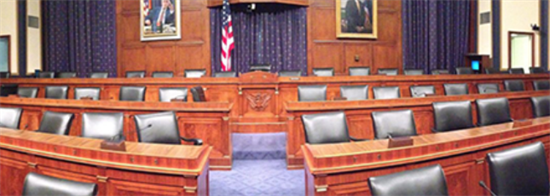House Passes Seven Committee BillsBipartisan Legislation Will Bring Much Needed Accountability and Transparency to Washington Regulators
Washington,
November 19, 2015
Tags:
Federal Reserve Reform
WASHINGTON - This week the House passed seven bills with bipartisan support from the Financial Services Committee. Below is the list of bills passed by the House: H.R. 3189, the “Fed Oversight Reform and Modernization Act of 2015” Sponsor: Rep. Bill Huizenga (R-MI) H.R. 3189 would improve the economy’s performance by bringing greater accountability and transparency to the Federal Reserve. The FORM Act provides the Fed with a framework for communicating monetary policy decisions in a more transparent manner. Clear communication of monetary policy by the Fed facilitates better economic decisions by market participants and American households. This bill does not legislate any particular monetary policy course – indeed, it explicitly preserves the Fed’s flexibility to prudently address changing economic conditions. Rather than constraining the Fed’s policy choices, requiring the Fed to explain differences between a familiar reference rule and its independently chosen monetary policy increases transparency in what can otherwise be a complex and exceedingly opaque process. H.R. 3189 passed the House with bipartisan support 241-185. Financial Services Committee Chairman Jeb Hensarling (R-TX) said during debate on the FORM Act, “The Fed’s monetary policy must be made clear and credible and its regulatory activities must comport with the rule of law and bear public scrutiny. To accomplish this, the Fed Oversight and Reform and Modernization Act (FORM Act), authored by Congressman Huizenga should be enacted into law. Reform, accountability, and transparency on one hand; and independence and conduct of monetary policy on the other are not mutually exclusive concepts.” H.R. 1210, the “Portfolio Lending and Mortgage Access Act” Sponsor: Rep. Andy Barr (R-KY) H.R. 1210 would address the onerous requirements of Section 1411 of the Dodd-Frank Act that restrict access to mortgage credit for good borrowers and codifies the commonsense understanding that financial institutions who hold mortgages on portfolio have a vested interest in insuring that their customers repay their mortgages. H.R 2673 would provide regulatory relief for community financial institutions and make it easier for Americans to access affordable mortgage credit and put a stop to “QM” standing for “quitting mortgages.” H.R. 1210 passed the House with bipartisan support 255-174. “It should not be the job of Congress or unelected and unaccountable Washington regulators to decide who gets a mortgage and who does not, or to force community banks and credit unions to function like regulated utilities, issuing only plain-vanilla mortgages rubber-stamped in Washington. This common sense legislation recognizes that the most effective way to ensure that a borrower has the ability to repay is not a one-size-fits-all, top-down regulation from Washington that mandates the terms of loans and underwriting practices,” said Chairman Hensarling. H.R. 1737, the “Reforming CFPB Indirect Auto Financing Guidance Act” Sponsor: Rep. Frank Guinta (R-NH) H.R. 1737 repeals a misguided bulletin issued by the Consumer Financial Protection Bureau relating to indirect auto lending compliance and the Equal Credit Opportunity Act. The bill also requires the CFPB to follow a more transparent process when issuing subsequent auto finance guidance. H.R. 1737 passed the House with a veto-proof margin 332-96. “The CFPB’s flawed Bulletin on ‘Indirect Auto Lending and Compliance with the Equal Credit Opportunity Act’ attempts to regulate compensation paid to auto dealers, despite auto dealers being specifically exempted in the Dodd-Frank Act from CFPB’s rulemaking. By issuing this bulletin, the Bureau went far beyond clarifying existing law and instead is attempting to make new policy through this guidance, and doing so without going through the normal rulemaking process and without public input. This is an affront to due process, an affront to the rule of law and an affront to basic fairness,” said Chairman Hensarling. H.R. 1317, to amend the Commodity Exchange Act and the Securities Exchange Act of 1934 to specify how clearing requirements apply to certain affiliate transactions, and for other purposes Sponsors: Rep. Gwen Moore (D-WI) and Rep. Steve Stivers (R-OH) H.R. 1317 provides much needed regulatory relief to commercial businesses inappropriately captured by some of the costly and burdensome requirements of Title VII of the Dodd-Frank Act. H.R. 1317 passed the House by voice vote on November 16. H.R. 3032, the Securities and Exchange Commission Reporting Modernization Act of 2015 Sponsors: Rep. Kyrsten Sinema (D-AZ) and Robert Hurt (R-VA) H.R. 3032 eliminates a reporting requirement for the Securities and Exchange Commission that has already been eliminated for all other federal agencies. H.R 3032 passed the House by voice vote on November 16. H.R. 1478, the Policyholder Protection Act of 2015 Sponsors: Reps. Bill Posey (R-FL) and Brad Sherman (D-CA) H.R. 1478 prohibits federal banking regulators from moving the assets of healthy state-regulated insurance subsidiaries of larger financial firms to a failing bank subsidiary if the state insurance regulator determines the transfer would harm the status of the insurer. H.R. 1478 passed the House by voice vote on November 16. S. 2036, the Equity in Government Compensation Act of 2015 S.2036 is the companion bill to H.R. 2243, sponsored by Rep. Ed Royce (R-CA). The bill reinstates the salary caps for the CEOs at Fannie Mae and Freddie Mac that were in place last year –those compensation restrictions were dramatically increased by the Director of the Federal Housing Finance Agency earlier this year. S. 2036 passed the House by voice vote on November 16. ### |


